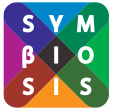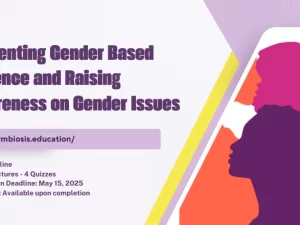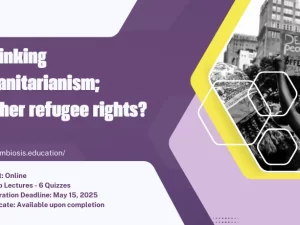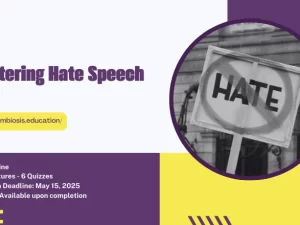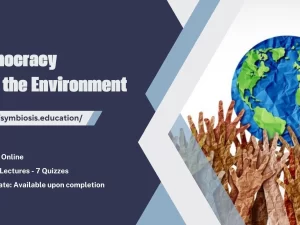Re-wiring Democracy: connecting institutions and citizens in the digital age
- Description
- Curriculum

The course on “Re-wiring Democracy: connecting institutions and citizens in the digital age” explores democratic participation and addresses key issues concerning the challenges the rise of the internet poses to the traditional functioning of representative democracy. Central to the discussions is the examination of how digital tools and spaces are reshaping the relationship between citizens and institutions, and whether technology alone is sufficient to amplify citizens’ voices in meaningful ways.
Can digital organizing set safeguards and standards for e-democracy applications? How can civil society and other democracy advocates harness these tools to enhance efficiency, accountability, and transparency? Is it possible to make media literacy a universal skill, and should e-citizenship competencies become an integral part of civic education programs? How can education and e-learning empower citizens with the skills necessary for active participation in digital societies, including responses to challenges like hate speech and digital surveillance? The focus of the presentations includes: digital politics and digital democracy; digital organizing; digital journalism and social media; media and disinformation; digital citizenship education; elections in the digital era; and the impact of digital technology on governance.
-
1The unrealised potential of digital organising in Europe - Ned Howey
This course explores the unrealized possibilities of digital organizing in Europe, focusing on how people—not just technology—drive meaningful change. It highlights key elements of successful campaigns, such as building relationships, empowering leadership, and fostering local, decentralized activism. Drawing on insights from "The State of Digital Organizing in Europe 2020," the course offers practical recommendations, including enhanced communication, investment in training, and a cultural shift towards decentralizing power.
-
2Quiz
-
3Media Literacy as a tool to address disinformation - Nikos Panagiotou
This course explores the role of media literacy in combating disinformation, highlighting the importance of understanding the creation of media products, critical cultural analysis, and awareness of media delivery models. Participants will learn essential techniques for analyzing media, debunking myths, and fostering critical thinking. The course emphasizes the integration of media literacy into a broader pedagogy for empowered citizenship, promoting civic competence and active participation in democratic processes.
-
4Quiz
-
5Teaching and research through the web: questioning the solution - Stavros Nikiforos Spyrellis
This course explores the challenges and solutions of digital teaching and research, focusing on how internet access shapes education and research dynamics. Using the Athens metropolitan area as a case study, participants will examine the impact of social inequalities on online learning and access. Topics include the limitations of online teaching, challenges in conducting remote research, and the risk of biased samples. The course offers actionable insights into overcoming these obstacles, improving digital education, and developing more effective and inclusive research methodologies.
-
6Quiz
-
7Democracy and Resilience in the time of Climate and Pandemic Crises - Eleni Myrivili
This course examines digital governance and resilience in response to the ongoing challenges posed by climate change and pandemics. Participants will explore how the traditional governance model has proven unsustainable and discuss the need for new, more inclusive approaches to recovery. Topics include the decentralization of power, community involvement in solution-building, the role of digital media in fostering resilience, and the importance of diversity in ensuring social cohesion. The course highlights strategies that leaders and policymakers can adopt to create more resilient and equitable crisis responses.
-
8Quiz
-
9How to Educate a Digital Citizen - Iryna Sabor
This course explores the challenges and opportunities of civic education in the digital age. Participants will examine key issues facing schools today, including cyberbullying, exclusion, disengagement, disinformation, and the impact of digital media on student well-being. The course will introduce essential topics for educating a digital citizen, focusing on the ten domains of Digital Citizenship Education as outlined by the Council of Europe. Participants will also explore effective models for teaching digital citizenship, equipping students with the skills needed to navigate the digital world.
-
10Quiz
-
11Voting amidst a pandemic: the time for internet voting? - Adrià Rodríguez-Pérez
This course explores the role of e-voting in ensuring secure, democratic elections in challenging times. Participants will examine the risks associated with in-person voting, including crowding and logistical difficulties, and discuss how digital voting systems could address these issues. The course highlights the current use of internet voting in eight countries and considers its broader applications for public and private organizations. Participants will explore the potential and limitations of e-voting as a tool for democratic participation in an evolving world.
-
12Quiz
-
13An overview of disinformation, (social) media, technological tools, & policymakers’ viewpoint - Syed Iftikhar Hussain Shah
This course provides a comprehensive overview of disinformation, media dynamics, and technological tools designed to combat misinformation. Participants will explore key concepts such as fake news, information disorder, and the challenges of news media in the digital age. The course also highlights fact-checking tools, including those from the Co-Inform project, and examines the role of policymakers in addressing the spread of disinformation. Through case studies and analysis, participants will gain insights into the complexities of navigating and combating misinformation in today’s digital landscape.
-
14Quiz
-
15Digital Power - Carl Miller
This course explores how power in politics is evolving in the digital age. Focusing on the impact of technology, social media, and data-driven strategies, participants will learn how political candidates and parties are utilizing new tools to connect with voters. The course delves into the reshaping of democratic processes, illustrated through examples like the Sunflower Movement and Taiwan's V democracy. By examining how technology influences political power, participants will gain insights into the revolutionary changes affecting democracy and decision-making today.
-
16Quiz
